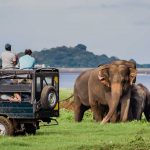Conscious Luxury – I am always worried about the luxury word as, going back to its Latin root it means excess! So conscious luxury must be moderated by a great Ancient Greek philosophy: merden agaan – nothing to excess. This after all could be a conceptualisation of sustainability. So conscious luxury is about indulgence that does not cost the earth, that triggers a deeper spiritual contentment far more soul-satisfying than the transient hedonism of modern concepts of superficial luxury. That visceral tingling from waking up before dawn and gazing on the first light on the high Himalaya; the deep inner peace and revitalisation of Shinrin-yoku (or, as we define it in an authentically Nepalese style, Ban Magan) – being at one with and within a forest; that sense of wholeness and silence when leaving behind the trappings of today’s existence and sitting on a deserted beach at sunset. It is the luxury of an excess of awareness of spiritual awakening.

This is at the core of Tiger Mountain’s journey into Regenerative Tourism – an approach to tourism that goes beyond the earlier avatars of Eco-, Sustainable- and Responsible-Tourism, all of which we good and part of a steady and positive process of evolution. Regenerative Tourism does not merely seek to halt the decline, to ensure nothing gets worse, but to turn processes round to ensure destinations are healed and the processes are repaired and restored. Add to this an enhanced experience for our guests as their journey is grounded in the realities of Nepal – people and place. This lays the ground for those wonderful moments of connection that raise a holiday to the highest level of transformation.

Tiger Mountain has a rich heritage from sister companies and pioneers, Tiger Tops in Chitwan and Mountain Travel in the high Himalaya. Both founded in the mid-1960s and both with a clear vision to tread lightly in Nepal, to care for the natural environment, to look after employees and their home communities as key stakeholders and partners in the business…and all this way before even eco-tourism had been invented as a buzz-word. Tiger Mountain draws on this foundation and mind-set in applying regenerative principles across the gamut of operations and activities at or through the lodge: environmental, social, cultural and employment related. So we have ended almost all single use plastics and now the only remaining usage is of organic-certified compostable plastic where essential. We are the first lodge in Asia to join the UNEP / UNWTO Tourism Plastics Initiative. We recycle almost all our waste, upcycle food waste to bio-gas for the staff kitchen and then the remaining slurry goes on to our organic gardens to close the loop. All walks are led by expert local guides (fully salaried employees) who are trained and aware of the need to mitigate impacts. These same staff lead in spreading the message of healing the environment within their communities and families. We work closely with the Community Forest User Group to enhance and avoid damage to the community forest areas around the lodge. We also have a range of ‘citizen science’ programmes monitoring the bio-diversity of the area, for example the Annual Asian Wetlands Bureau Waterfowl Census has been led by the lodge guides across all the Pokhara Valley Lakes for 19 years and counting. Also a monthly butterfly count is conducted in the lodge grounds and the data recorded for the diversity of species seen and abundance of individuals.

Community support is another key element of our regenerative work – this is led by our Community Support Partnership Programme officer, Hari Pariyar. We work with the community to ensure that we support only community-based and community-led initiatives to ensure ownership is retained and sustainability is ensured. The community focus is on enhanced educational opportunities within the village so we have had a series of capital projects to enhance schools beyond infrastructure that can be supplied from government budgets. In addition we have operated an innovative mentoring programme to help local teachers partner with UK teacher volunteers to enhance pedagogy and improve English language teaching skills.

On the staff front, all are full-time salaried employees and all receive significantly more than the legal minima. This is both in salary scales and additional facilities such as fully funded medical compensation for the employee spouse and children or parents of the employee if unmarried. The staff have remained with the company since its start in 1998 with over 85% of the original team still working today. During covid, the employees received 6 months on full pay even after lockdowns started. Now, although pay deferrals have had to be implemented, all is with full employee support and the cut amount will be refunded to the employees over time once the situation eases.

For our guests, the key we feel is the sense of place – truly Nepal and truly the middle hills of Nepal where the lodge is located. So we focus on local seasonal produce and traditional local recipes; we focus on authentic experiences so walks explore the community as it is, not in a stage-managed and artificial manner. Hospitality is truly Nepalese and is unstinted. Be it meeting the local community, supporting a butterfly count and interaction with local school teachers, all are grounded in the present realities of Nepal.
Time is needed to create and achieve the regeneration we seek – nature does heal, cultures constantly evolve, but we are on the road, setting a steady pace and seeing the first glimmers of that healing and rebound that is at the heart of Regenerative Tourism.





